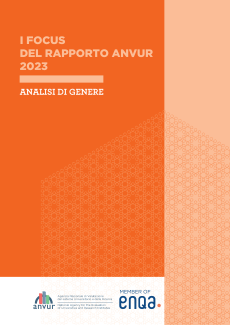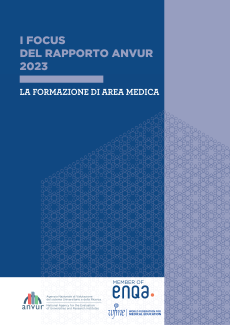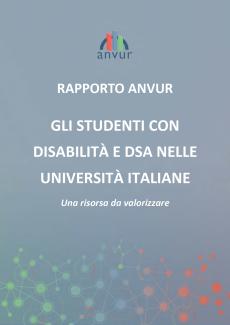The thematic reports published by ANVUR serve as valuable tools for understanding the dynamics and performance of the Italian university and research system. Through detailed analyses and up-to-date data, the Agency provides a comprehensive overview of academic activities, research outcomes, and initiatives for inclusion and development.
This section gathers all the thematic reports produced by ANVUR, with the aim of promoting transparency, continuous improvement, and dialogue with institutional, academic, and international stakeholders.
"Gender Analysis" – Focus of the 2023 ANVUR Biennial Report

The Focus on Gender Analysis offers a detailed overview of gender composition within Italian universities, covering various academic and professional categories. The analysis begins with first-year and enrolled students in Bachelor's, Master’s, and single-cycle degree programmes, followed by PhD students, research fellows, and participants in specialisation schools.
It then explores technical-administrative staff, highlighting gender distribution across different roles and career levels, as well as academic staff, with specific attention to positions such as Rector and candidates for the role of Commissioner for the National Scientific Qualification (ASN). The gender composition of personnel in Research Institutes is also examined, distinguishing between research-related activities and other technical-administrative and managerial roles.
Special attention is given to the work of the Equal Opportunities Committees (CUG), to gender-related aspects in the most recent Research Quality Evaluation (VQR 2015–2019), and to international comparisons. The Focus concludes with an analysis of trends and challenges emerging from the data, providing a valuable tool to promote greater gender equality within the academic and research systems.
"Medical Education" – Focus of the 2023 ANVUR Biennial Report

The Focus on Medical Education offers an in-depth and structured analysis, introduced by an international comparison of key indicators that place Italy alongside France, Germany, the United Kingdom, and Spain. This section also provides a summary of the admission procedures for the degree programme in Medicine and Surgery across the countries considered.
The focus then shifts to the evolution of the educational offer of single-cycle Master’s degree programmes in Medicine and Surgery in Italy, highlighting significant changes over the past decade and analysing trends in enrolment and graduation numbers. It further explores the transformations brought about by the introduction of the national admission test for stydu programmes at public universities. The Focus provides a detailed examination of the admission test results, including data and statistics on participants, scores, and enrolled universities.
The report also analyses the context of postgraduate specialisation schools in the healthcare field, with an in-depth look at admission procedures, the number of available and filled positions, and the dynamics at the level of individual schools and universities.
"Students with Disabilities and Specific Learning Disorders in Italian Universities" – ANVUR Report 2022

The Report "Students with Disabilities and Specific Learning Disorders in Italian Universities – A resource to be valued" represents the first systematic survey on the presence and inclusion of students with disabilities and Specific Learning Disorders (SLD) in the Italian university system.
The survey is based on the WHO’s ICF classification, which interprets disability as the result of the interaction between the individual and the environment.
The methodology involved a preliminary analysis of existing documentation and current regulations, followed by the administration of a questionnaire divided into five sections: general and organisational information, students, services and interventions, resources, and networks. The data collection, conducted between July and October 2020, involved 90 universities.
The survey objectives address the needs of various stakeholders: for ANVUR, to collect evaluative data on services; for the National University Conference of Disability Delegates (CNUDD), to define a reliable data collection process; for the Ministry of Universities and Research (MUR), to establish a database to support the allocation of the Ordinary Financing Fund (FFO); for individual universities, to integrate inclusion into strategic planning.
The Report is structured into five chapters, analysing the student population with disabilities and SLD, the organisation of support services, the resources employed, and the collaboration networks of universities. This multidimensional approach provides a solid foundation for the development of policies and interventions aimed at the continuous improvement of services, in response to the President of the Republic’s call to ensure access to university education as a tool for social inclusion.
